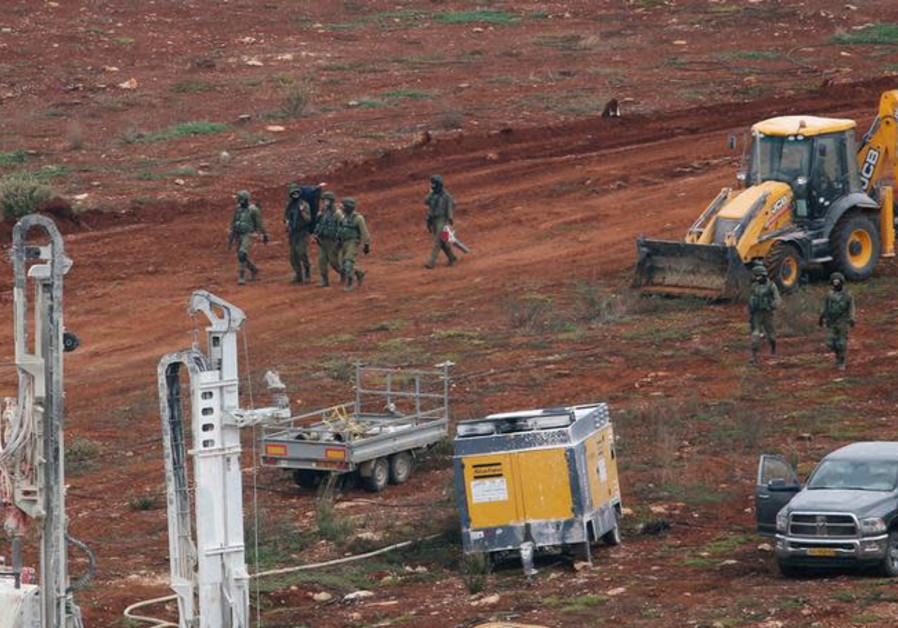Alleged Hezbollah members near northern border, IDF fires warning shots

Israeli soldiers walk together as seen from the village of Kfar Kila, in south Lebanon December 4, 2018.. (photo credit: REUTERS/ALI HASHISHO)
The IDF opened fire towards what seemed to be three Hezbollah members, who came close to Israel’s northern border on Saturday afternoon.
It was the first instance of gunfire along the border since the IDF last began Operation Northern Shield along its side of the northern border to destroy Hezbollah tunnels.
To date, two tunnels have been identified. The army believes that the alleged Hezbollah members were making use of the fog and rain to approach an Israeli technological team that was working on the Israeli side of the border.
On Friday, Prime Minister Benjamin Netanyahu spoke by telephone with Russian President Vladimir Putin to update him on the tunnel operation.
The two leaders agreed that they would hold a face-to-face meeting, but no date was set. In addition, they concluded that security delegations from both countries would also meet.
שוחחתי בטלפון עם נשיא רוסיה ולדימיר פוטין ועידכנתי אותו על פרטי מבצע “מגן צפוני” ועל המשך כוונתה של ישראל לסכל את איום המנהרות.
סיכמנו שמשלחות ביטחוניות משתי המדינות ייפגשו בקרוב ושתתואם פגישה בינינו בהמשך
— Benjamin Netanyahu (@netanyahu) December 8, 2018
Netanyahu underscored to Putin that Israel was determined to halt Hezbollah’s aggression against Israel and to prevent Iran from establishing a military presence in Syria.
On Thursday, Lebanese Ambassador to the United Nations in New York Kacou Houadja Léon Adom sent a letter to the security council in which he warned that Israel planned to attack his country as part of Operation Northern Shield.
The IDF said that it only plans to operate against the Hezbollah attack tunnels on the Israeli side of the border, but Lebanon fears that Israel won’t be bound by that limitation and will also operate against the tunnels in southern Lebanon.
On Friday, Israeli Intelligence Minister Israel Katz, who is also a member of Israel’s security cabinet, appeared to indicate that Israel could consider military action in southern Lebanese territory if necessary.
“If we think that in order to thwart the tunnels that one needs to operate on the other side – then we will operate on the other side of the border,” Katz told Radio Tel Aviv 102FM.
On Thursday, Israel asked the UN peacekeeper missions, otherwise known as the UN Interim Force in Lebanon (UNFIIL), to close Hezbollah tunnels on the Lebanese side of the border.
In his letter to the UNSC, which was published by Israel on Friday, Adom said that Israel has already “breached the Lebanese communications grid by hacking into the telephone network and sending recorded messages to peaceable civilian inhabitants of the southern part of the village of Kafr Killa warning them of imminent explosions to take place on Lebanese territory that might put their lives at risk.”
Earlier this week, Israel published information that a tunnel into its territory had been dug from Kafr Killia.
“This constitutes a new and extremely serious attack on the security and safety of the citizens of Lebanon, whereby Israel is violating the dignity and privacy of individuals and making a direct threat against their lives,” the envoy said.
He accused Israel of violating UN Security Council Resolution 1701, which set out the cease fire terms that ended the Second Lebanon war in 2006. Even before the tunnel operation, the envoy said, Israel was routinely violating Lebanese airspace, something that is probating under Resolution 1701.
A report by the office of UN Secretary-General Antonio Guterres earlier this month said that there had been a increase of 35% in Israeli aerial activity over Lebanon. His office has accused both sides of violating Resolution 1701.
The Lebanese envoy called on the UNSC to “take all measures necessary to confront this systematic campaign being waged by Israel and Israel’s ongoing violations of Lebanese sovereignty, which are a threat to the security and stability of the entire region.”
Israel’s Ambassador to the UN Danny Danon said, “The Lebanese government, under whose rule Hezbollah has established an underground network of missiles and has dug tunnels entering into Israel, is hypocritically seeking to condemn Israel, which is working to defend its citizens.
“Israel calls on the Security Council to convene as soon as possible to discuss the actual violations of UN Security Council Resolution 1701, as clearly revealed this week in Operation Northern Shield. In the upcoming debate, we will present conclusive evidence of Hezbollah’s violations and the willful blindness of the Lebanese government,” Danon said.
Reuters contributed to this report.
Join Jerusalem Post Premium Plus now for just $5 and upgrade your experience with an ads-free website and exclusive content. Click here>>






Comments are closed.